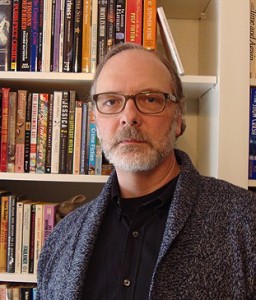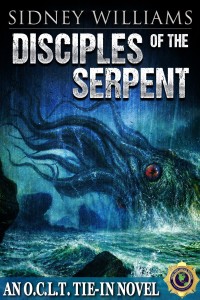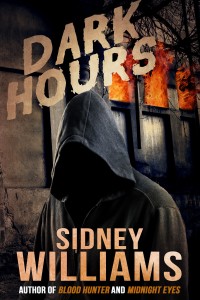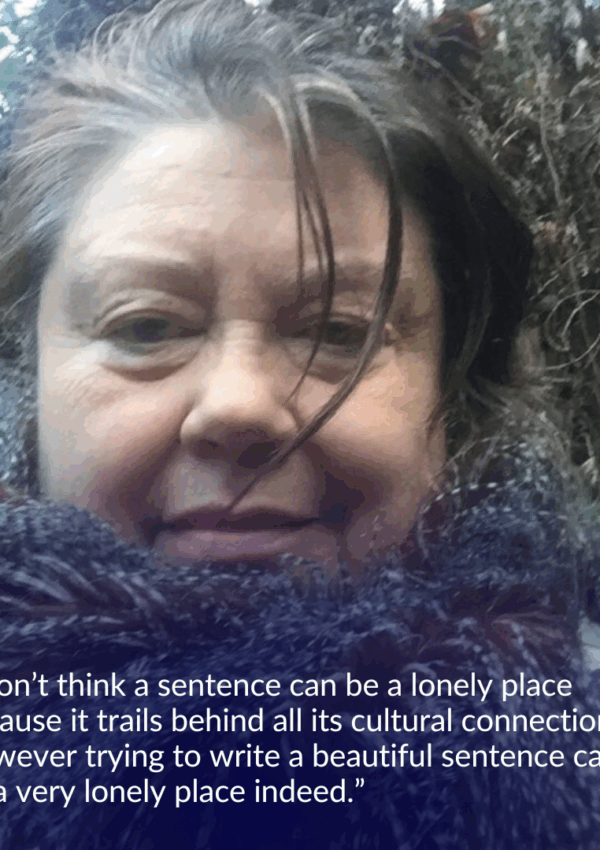An interview by Alicia Cole.
 Sidney Williams is the author of eight traditionally published books, five under his own name and three young adult titles under his Michael August pseudonym. He’s also written a host of short stories for magazines and anthologies including “Under the Fang,” comic book scripts for publishers including Malibu Graphics, Campfire, and Caliber, and scripted an audio drama adaptation of H.G. Wells’ “The War of the Worlds,” believed to be the first full-cast audio drama set in the same time period as the novel.
Sidney Williams is the author of eight traditionally published books, five under his own name and three young adult titles under his Michael August pseudonym. He’s also written a host of short stories for magazines and anthologies including “Under the Fang,” comic book scripts for publishers including Malibu Graphics, Campfire, and Caliber, and scripted an audio drama adaptation of H.G. Wells’ “The War of the Worlds,” believed to be the first full-cast audio drama set in the same time period as the novel.
Sidney is a former journalist. His undergraduate degree is in communication arts. He worked several years in corporate communications before earning an MFA from Goddard College in 2010. That same year Crossroad Press began re-issuing his novels in ebook and audiobook form, and he has written several new works for Crossroad. His novels include Azarius, Blood Hunter, When Darkness Falls and the newer Louisiana-set serial killer thriller Midnight Eyes.
Recently he completed a novel called Disciples of the Serpent, a supernatural thriller that’s part of Crossroad’s ongoing O.C.L.T. series.
Sidney has also expanded a short story first published in Cemetery Dance into the short novel Dark Hours.
In addition to writing, Sidney teaches a creative writing course focused on horror, mystery, and suspense. He is a member of the International Thriller Writers and has served as a contributing editor for their monthly newsletter “The Big Thrill.” His short story “Mr. Berrington” appeared in Black Fox Literary Magazine.
Black Fox Literary Magazine: Your new novel, Disciples of the Serpent, takes place in Ireland. What do you find so inspiring about this country?
 Sidney Williams: I was a journalist for a number of years, and long before I visited the British Isles, I interviewed a minister who’d traveled there. He spoke of the profound emotional impact he felt in stepping into a stone structure that was a thousand years old. It channeled for him the notion of the past and the people who’d stood on the same spot, lives lived and the scope of years. That stayed with me.
Sidney Williams: I was a journalist for a number of years, and long before I visited the British Isles, I interviewed a minister who’d traveled there. He spoke of the profound emotional impact he felt in stepping into a stone structure that was a thousand years old. It channeled for him the notion of the past and the people who’d stood on the same spot, lives lived and the scope of years. That stayed with me.
When I traveled to Britain and Ireland a few years ago, I visited ruins, old monasteries, castles, and cemeteries, and that came back to me as I sat down to write, and I felt that emotion too, and it blended with my own interest in secret histories and lost knowledge. With that much time and history, there almost has to be magic.
There are many things we know about historic people, particularly in Ireland, but there’s much we don’t. When the opportunity to write an O.C.L.T. thriller presented itself, it sort of triggered my imagination. I’d wanted to write something about Ireland, and the series is all about facing the unknown and the unexplained, so it was a good chance to meld some ideas that intrigue me.
BFLM: Speaking of the O.C.L.T. series, are these books intertwined? Do you have anything else coming up in this series?
SW: O.C.L.T. stands for Orphic Crisis Logistical Taskforce. The series was created by David Niall Wilson, founder and CEO of Crossroad Press. O.C.L.T., sometimes referred to as Occult, is an organization that responds to strange events around the globe. David wrote a series bible and created the key characters in true high adventure series fashion. There are some established parameters, but each novel stands alone.
Disciples of the Serpent is dubbed a tie-in to the series and introduces a secret division of An Garda Síochána, Ireland’s national police force, and Aileen O’Donnell, an Irish counter terrorism operative recently assigned to that sub rosa division. She sees herself as sidelined there, but as signs of conspiracy and a Lovecraftian-style horror arise, she finds a new cause and comes to terms with some personal demons. She interacts with a lot of the great established characters from the O.C.L.T. series including Geoffrey Bulfinch, who’s consulting with the Garda on a series of strange murders and with O.C.L.T.’s tech wizard Wendell “Mack” Macklemore. Bulfinch is interesting, an older man but a true swashbuckler, and his origins are clouded. He might be much older than we think. That appealed to me.
Investigation turns into a race across Ireland and through many ruins and landmarks, connecting information that can unlock something from pre-history. That something is big, of course.
It was a lot of fun to write in the O.C.L.T. world. As a kid I read a lot of series books, really the pulp equivalent of the ‘70s and ‘80s era, so it was an interesting experience for me to put on that hat as a writer and pen a high adventure piece. It’s Lovecraftian horror meets Da Vinci Code, sort of.
David and I have talked about more adventures that incorporate Aileen, maybe something globe-hopping for her that gets her out of Ireland and her comfort zone, something that begins with a discovery in an ancient Irish passage tomb and leads to threats the O.C.L.T. is dealing with in Machu Picchu or some other exotic locale.
Myth and legend intertwine around the globe, and I’m fascinated by that and always excited to explore those ideas and that connectivity of stories.
BFLM: Without giving too much away, your novel deals with several occult themes. How did you prepare for your novel?
SW: As I’ve mentioned, I’m fascinated by secret histories and lost knowledge. I’m also interested in created myth and things like the Cthulhu Mythos. I delved into a lot of Irish legend and the origins of those legends, and in research you often see how dots connect.
Sometimes I was writing as I researched, and I’d be surprised how closely things I’d imagined converged with legend.
I read a great deal about the Druids and the Ogham language as well, and it was fun to incorporate a bit of fictionalized pulp history in the mix as well. I’d played a little in that territory with a story called “Sleepers,” serialized online in Paper Tape magazine, and it was kind of fun to expand on that a bit and to incorporate an academic conspiracy in the mix. Aileen encounters financial backers of the central plot who sort of exhibit a different vein of cultish behavior as well, so there are parallels that were fun to explore.
I think cults of belief are also intriguing. They’re very much in play in our world today, so we really have three in play, the misguided academic cult, an economic cult of sorts, and then the disciples of the title, the more traditional cult who have grown out of twisted beliefs and even some deception. They of course want to rain chaos on the world, and the heroine and the O.C.L.T. have to try and stop that.
BFLM: Is there an occult topic or mythos you haven’t written about that you’d like to focus on?
SW: Myths and folklore that are tied to the land and the world around us are calling to me. There’s a long history of things that hover just beyond our perception, and of course older cultures feared faery abductions and that dark deeds lurked in the shadows.
Every culture has some variation on those secret figures, just with different names. I’m interested in exploring that further. I have to sort of find the story in my imagination. I’m thinking it might merge with what I once thought was a crime thriller idea.
BFLM: You do a nice, wicked thriller, as your novella Dark Hours also shows. What first drew you to the genre?
 SW: I’ve always liked mystery-thrillers, and after writing supernatural thrillers for some time, I shifted toward the things that often really scare us today and the things that disturb me. What’s really scarier than being trapped in a dark place with a dark and dangerous figure?
SW: I’ve always liked mystery-thrillers, and after writing supernatural thrillers for some time, I shifted toward the things that often really scare us today and the things that disturb me. What’s really scarier than being trapped in a dark place with a dark and dangerous figure?
Myths are always re-emerging in our storytelling also, that’s our as in all humans, from campfire stories to word processors. It’s impossible to escape that. I don’t know that we can ever really find our way out of the minotaur maze because it’s such a core story to us and our experiences and our fears. Where’s Rainsford really when he squares off against Zaroff in “The Most Dangerous Game?” In Ian Fleming’s original Dr. No, James Bond faces an obstacle course and winds up in a tank with a giant squid. Lee Child’s written about that in an essay. Where does Clarice find herself at the end of The Silence of the Lambs?
I was researching the history and development of the slasher film as I was preparing to teach a course in horror and realized I needed to deal with that non-supernatural, visceral side of things as well as classic and gothic narratives.
The more I thought about the conventions and their underpinnings, the more an expansion of a short story of mine, “The Exclusive,” originally published in Cemetery Dance, played in my head. That was helped along by a bit of interest that fizzled from a film producer and then a Hollywood agent. That kind of re-awoke the story for me creatively. I went through a creative dry period, so that was kind of a new beginning.
I realized there was more for my heroine, Allison Rose, if the spot the short story ended became a jumping off point. She’s passionate and driven and angered by blame-the-victim mentality.
She’s a student journalist lured into an interview with an escaped killer because she thinks dealing with college campus safety issues are important, and she finds herself in a maze of sorts, a large but creepy library basement with traps and puzzles set up for her by a mastermind, at least of a sort.
She’s wound tight, in part because of trauma she’s suppressed, and she has to call on everything she has to survive the situation, but she’s resourceful.
I really worked to make it a tight, short novel that can be experienced best in a single sitting. I was kind of excited when the ebook received some preliminary nominations for the Bram Stoker Award, though it didn’t make it to the final ballot.
Happily, Crossroad Press has issued paper editions on the heels of the ebook release. They’ll do that with Disciples as well. My relationship with Crossroad began with them bringing out my older books in ebook form and has expanded now to include new material.
BFLM: Who are your inspirations?
SW: Many of the classic horror writers. I read Robert Bloch and Ray Bradbury in junior high. In their day, they switched between supernatural and non-supernatural tales.
Bradbury’s “The October Game” and “The Emissary” chill in their own different ways.
Besides Psycho, Bloch wrote many devilish tales in many veins, if you will. H.P. Lovecraft fascinates. It’s interesting to see how his theories from “Supernatural Horror in Literature” are channeled into his fiction.
I really like anything by Lawrence Block, especially the Matt Scudder series. I love Raymond Chandler and Ross MacDonald as well and Sue Grafton and Shirley Jackson, and King and Straub and as far as supernatural adventure series go, I loved Robert Lory’s Dracula Horror Series when I was a kid. A psychic criminologist resurrects Dracula, controls him with an elaborate device, and uses Dracula to battle modern day evil. Borges and Murakami are in there too, and Jim Thompson and the German writer Thomas Bernhard, some Raymond Carver. I could go on and on.
BFLM: What works of literature are your must-haves?
SW: The box for the desert island? Hopefully I’d manage to throw in some things I haven’t read, but as far as those to re-read over and over if the stay is extended, I’d have to say Bradbury’s Something Wicked This Way Comes, Chandler’s The Big Sleep, Norman Mailer’s wildly insane noir Tough Guys Don’t Dance and some Sandman comics. I guess The Wind-Up Bird Chronicle. Better throw in the big collected book of Bradbury short stories and maybe the Library of America collection of Raymond Carver stories. That comes with a ribbon book mark, and I used to move it around then pick it up and read wherever the ribbon had stopped, and I still haven’t read all the stories. Maybe Gatsby, and one of Ross MacDonald’s Lew Archers. How big is the box? I always wind up with a suitcase that’s too heavy when I pack.




this was interesting to read